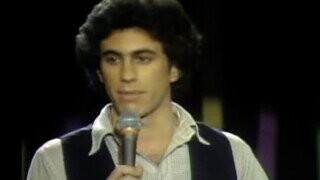The Comedy Store Wanted Nothing to Do With Young Jerry Seinfeld

Mitzi Shore was a king (and queen) maker in late 1970s comedy. In Los Angeles, her Comedy Store was considered the place for comics to be discovered for The Tonight Show, sitcom deals and more. While Budd Friedman’s Improv provided some competition when the New York venue opened up a California counterpart, it was Mitzi’s Comedy Store that had a reputation for developing young talent into superstars. Jimmy Walker, Richard Pryor, Robin Williams, David Letterman and Jay Leno packed them in.
But Shore could be tough on new comics as well. If Mitzi liked you, you were golden. If she didn’t, you were out of luck. And when Jerry Seinfeld, a veteran of New York clubs like the Improv, came to Los Angeles in 1980, she practically turned him away at the door, according to Richard Zoglin’s Comedy at the Edge: How Stand-Up in the 1970s Changed America. “I didn’t like his attitude,” Mitzi said of the young observational comic. “He didn’t fit in.”
It sounds like the dislike was mutual. To Seinfeld, the Comedy Store had “kind of a sick culture over there, to tell you the truth. Unless you were kind of a broken-wing bird, they had no interest in you," he said. "It wasn’t a healthy environment. Mitzi Shore didn’t like me. I came presold from New York — people kind of told her, ‘this guy’s coming out, he really good, you should put him on.’ Well, she didn’t like that. She told me to my face. She felt so many people liked me, that’s not good for a comedian. She wanted me to seek her counsel. She was like the kid with the drugs at school — if you want to be my friend, you’ll buy drugs from me.”
Don't Miss
Even in his early days, Seinfeld could be a know-it-all about comedy. He wasn’t nuts about the Comedy Store, starting with Mitzi’s comedy taste which skewed toward broad humor. “There was this whole prop-act thing in L.A. Kind of junky, gimmicky stuff. Guys that were pretty hacky.” (Seinfeld isn’t naming names but this was around the time Gallagher was a Store regular, smashing watermelons with sledgehammers.) “They were strong, they were crowd-pleasers, but they weren’t going anywhere.”
Seinfeld even seemed to believe rumors about the Comedy Store being haunted — or at least full of bad vibes. “There’s a darkness about that place,” he said. “Some people thought it was because, when it was Ciro’s, there were a lot of Mob rubouts there.”
The approval of Mitzi Shore and the Comedy Store was pivotal for most young comics, but not Seinfeld, who’d already established his bona fides at New York clubs like Catch a Rising Star and the Comic Strip. Friedman was more than happy to put on Seinfeld when he transitioned to the West Coast, and it wasn’t long before he’d made his Carson debut.
With Carson flashing the okay sign, who needed Mitzi? For that matter, who needed what Seinfeld considered to be the depressing atmosphere at the Comedy Store? “It’s painted black, with red, like blood,” the comic remembered. “It’s like hell.”